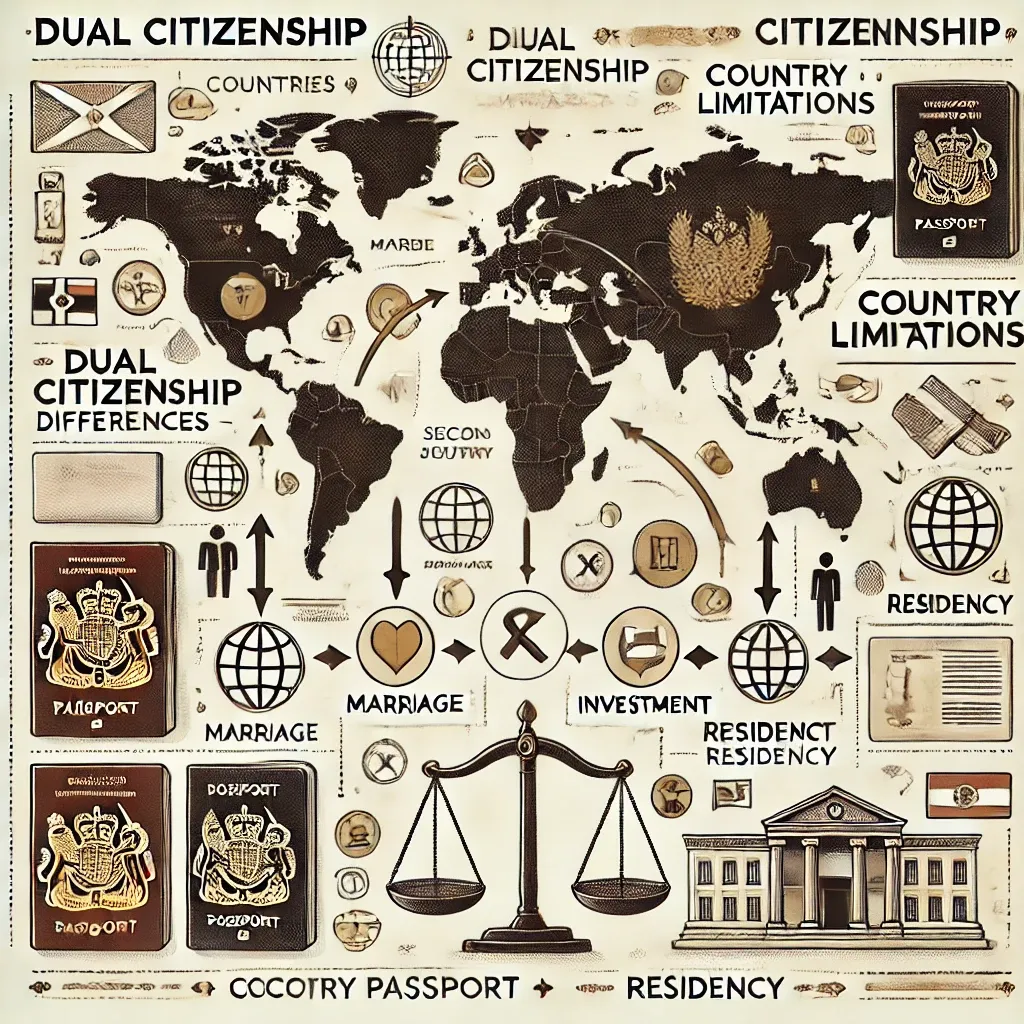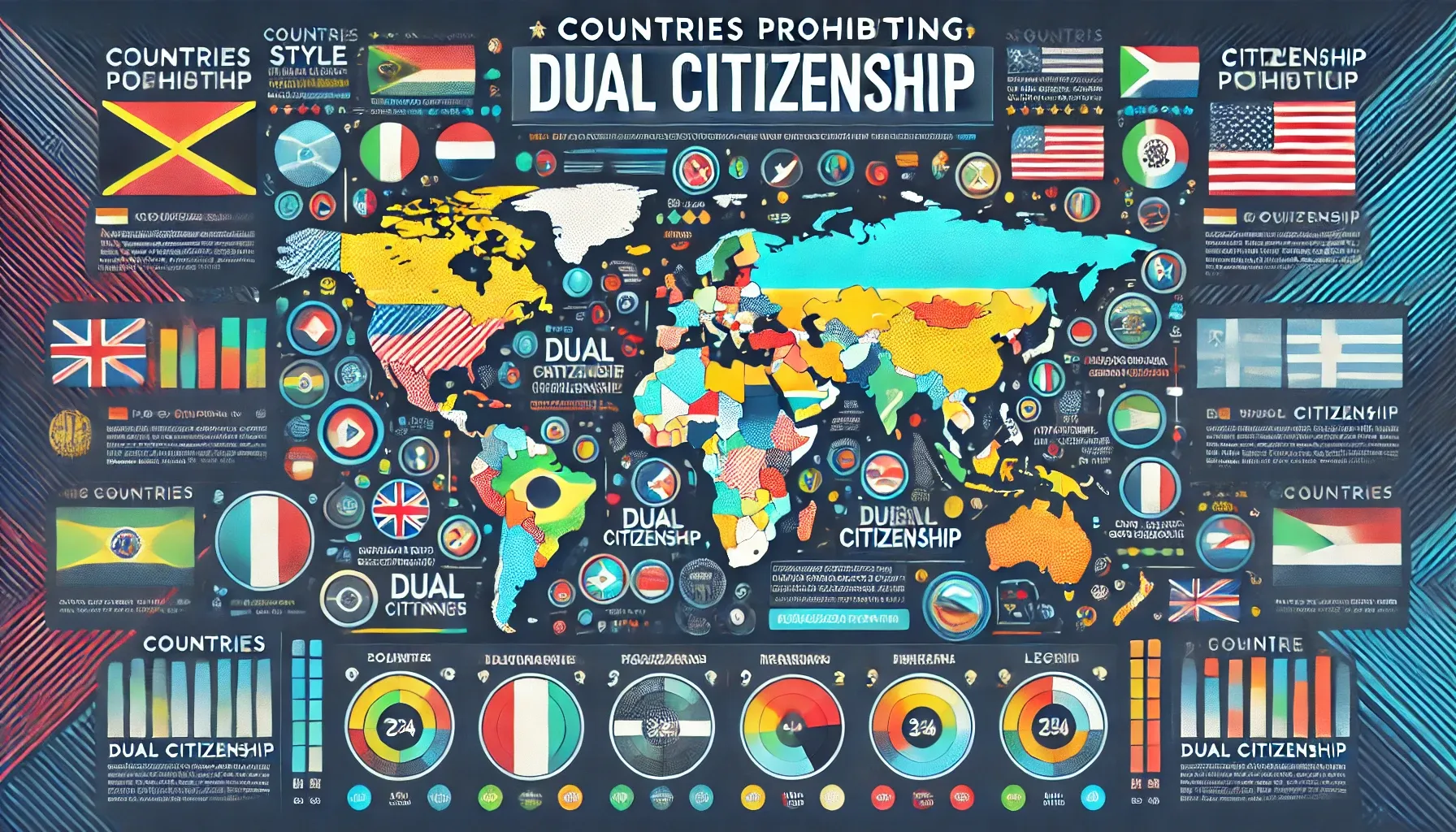What are the differences between dual citizenship and second citizenship?

- What is the difference between dual citizenship and second citizenship: main aspects
- In which countries is dual citizenship prohibited?
Dual and second citizenship: key differences
Dual and second citizenship are two different concepts that have their own characteristics. In this article we will take a closer look at how they differ and give examples of countries where multiple citizenship is not allowed.
Definition of terms
Let's start with the definitions of the terms: dual citizenship and second citizenship. What are their differences? Dual citizenship arises in situations where there is an international agreement between your country and another country where you plan to obtain a passport. This agreement ensures the recognition of the rights and obligations of citizens in both countries, allowing each to regard the other as an equal member of society.
If a citizen has dual citizenship, they are required to pay taxes, receive a pension, and serve in the military only in the country where they actually reside. For example, such agreements exist between France and Canada, while Italy has similar contracts with Argentina, Brazil, and Portugal. When a French citizen obtains Canadian citizenship, it is indeed a case of dual citizenship. By the way, people with dual citizenship are referred to as bipatrides.
The possibility of obtaining more than two citizenships
It should be noted that in some cases you may have more than two nationalities if there are relevant agreements between the affected states. This is what distinguishes dual citizenship from second citizenship.
Second citizenship
When such international agreements are absent, the question of dual citizenship arises. In this case, each state considers you as its citizen, unaware of the existence of other passports. This imposes on you the obligations to comply with the laws and pay taxes in both countries, as well as to serve in the military if required. In other words, you can simultaneously enjoy benefits in both jurisdictions.
The acceptability of dual citizenship
Speaking of dual citizenship, it is worth noting that the vast majority of countries in the world allow such a possibility. Nevertheless, before taking a step towards obtaining a new citizenship, it is necessary to make sure that there are agreements between your home country and the country in which you are interested in citizenship. To do this, you can visit the official resource of the government or consulate of the country you are interested in.
Countries that do not allow dual citizenship
It is also important to highlight a list of countries that fundamentally do not accept dual citizenship. In these countries, the possibility of dual citizenship may be completely denied, which is important to consider. A key point is to thoroughly study all legal aspects and potential consequences when making the decision to obtain a second citizenship, in order to avoid unpleasant repercussions later on.
Ways of obtaining citizenship
Finally, it is important to understand that the ways to obtain citizenship in another country can vary. You can acquire it through:
- naturalization,
- marriage to a citizen of another country,
- investments,
- and other state-mandated programs.
Each of these paths has its own characteristics and requirements that should be taken into account to ensure a successful citizenship application process.
29 September
9 October 2024
29 January
9 October 2024


Countries with restrictions on dual citizenship
In the modern world, there are many countries with strict regulations regarding dual citizenship. In these countries it is impossible to obtain a second visa, i.e. a passport. Such countries include Austria, India, Mauritania, the Netherlands, Slovakia, Azerbaijan, Indonesia and many others.
This list of countries also includes:
- Madagascar
- Norway
- Suriname
- Andorra
- Iran
- Malawi
- United Arab Emirates
- Tanzania
- Afghanistan
- Kazakhstan
- Malaysia
The practice of strict regulation regarding citizenship is also observed in:
- Oman
- That
- Bahrain
- Katare
- Maldives
- Palau
- Uzbekistan
- Vanuatu
- Kiribati
Additional examples of countries with strict restrictions
Also included in the zone of countries where dual citizenship is prohibited are:
- Marshall Islands
- Rwanda
- Ukraine
- Guyana
- Kuwait
- Micronesia
- San Marino
- Montenegro
- Guinea
- Laos
- Monaco
- Sao Tome and Principe
- Eritrea
- Georgia
- Lesotho
- Mongolia
- Saudi Arabia
- Estonia
- Djibouti
- Liberia
Exceptions in some countries
Despite the presence of global trends,there are exceptions in some countriesFor example, in the Netherlands, although dual citizenship is officially prohibited, there are certain conditions under which it is possible to obtain it legally. This can happen if:
- A person became a citizen of another country by birth.
- He was raised there in his childhood.
- He obtained citizenship automatically due to marriage.
Therefore, you should always carefully study the specifics of the laws regarding dual citizenship in different states.
Prestigious passports and the likelihood of obtaining a second citizenship
Moreover, recent studies have shown that the passports of certain countries are considered some of the most prestigious in the world. The question of having dual citizenship is becoming relevant, and it is useful to know which countries have strict regulations. There are several countries where the likelihood of obtaining a second citizenship is extremely low:
- Andorra
- Djibouti
- Kuwait
- Myanmar
- Slovakia
- Azerbaijan
- India
- Kyrgyzstan
- Nepal
- Solomon Islands
In addition, the following are included in this list:
Countries such as Belarus, Yemen, Malaysia, Papua New Guinea, and Tonga also have strict restrictions regarding dual citizenship. Additionally, it is worth noting:
- Botswana
- Kazakhstan
- Marshall Islands
- San Marino
- Turkmenistan
- Bhutan
- Qatar
- Micronesia
- Saudi Arabia
Additional countries with restrictions
It's also worth mentioning:
- China
- Mozambique
- Eswatini
- Uzbekistan
- Vietnam
- Congo
Monaco, North Korea, Ukraine, Haiti, Haiti, Cuba, Mongolia and Singapore do not allow you to hold two passports. As a result, if you are a citizen of any of these countries, you will not be able to obtain a second passport without disclosing your first nationality. Similarly, the same situation may arise if your home country allows dual citizenship, but the second country has strict restrictive measures on this aspect.
Ways to obtain citizenship in another country
If you are interested in obtaining citizenship of another country, there are several methods to consider. For example, one method is naturalization, which requires residence in the country for a certain period of time, which varies depending on the laws of the country. The possibility of obtaining citizenship also exists in cases of:
- birthday;
- of kinship;
- origin.
Thus, before deciding to change citizenship, it is extremely important to familiarize yourself with the conditions and restrictions in the country of interest.

Conclusion
In conclusion of my review on dual and second citizenship, I want to emphasize that these two concepts have significant differences that are extremely important for anyone considering the possibility of obtaining citizenship in another country. I have thoroughly examined how the legal frameworks for dual and second citizenship are structured, as well as provided examples of countries where such citizenship is practically impossible.
As I found out, having agreements between states can open the door to a simpler process for obtaining adual citizenship...which allows for living a life in two cultures and obtaining rights and responsibilities in both states. However, for most countries with strict regulations, having...second citizenshipcan cause serious consequences, such as loss of first citizenship.
It is important to note that there are exceptions that can change the perception of the rules. Countries like the Netherlands allow dual citizenship under certain circumstances, which only emphasizes how thoroughly one should study the legislation of each country.
Recommendations
- Study each country's legal documents.
- Consult legal experts in the field of migration law.
- Please pay attention to possible exceptions.
Thus, if you are planning to expand your horizons and consider citizenship of another country, be attentive to the nuances of these processes. Approaching the issue with due seriousness and understanding can prevent many legal problems in the future.
I hope this article has provided you with useful information and that you can use it for your purposes. Always remember to check for up-to-date information and consult with professionals to avoid misunderstandings regarding citizenship issues.
Comment
Popular Posts
29 September
367
9 October 2024
9938
9 October 2024
1485
Popular Offers

Subscribe to the newsletter from Hatamatata.com!
Subscribe to the newsletter from Hatamatata.com!
I agree to the processing of personal data and confidentiality rules of Hatamatata












